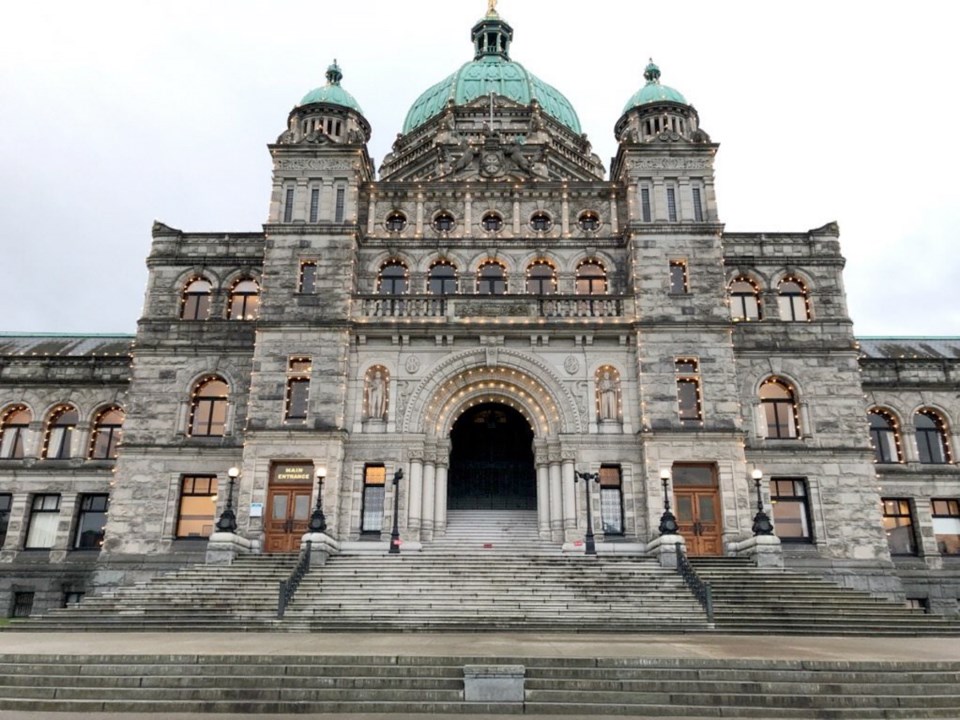Thousands of B.C. forestry workers and their supporters are planning to gather for a rally on the B.C. legislature lawn Tuesday afternoon, coinciding with the release of the province’s 2020 budget.
The rally is intended to bring attention to the revenue the forestry industry creates and the people it supports, from loggers and tree fallers to industry suppliers and business owners, said Carl Sweet, a heavy equipment salesman in Campbell River and one of the event’s organizers.
“I think people have really lost touch on how important forestry is to this province and what it pays for,” Sweet said. “We wouldn’t have the life we’ve come accustomed to with our social programs, and our hospitals, and our school systems and flat roads if it wasn’t for the revenues from forestry.”
A 2017 report by consulting firm PwC said the forestry industry contributed $12.94 billion in gross domestic product to the province and supported more than 140,000 jobs directly and indirectly. The report was commissioned by the Council of Forest Industries.
The grassroots group behind the rally, B.C. Forestry Alliance, is concerned that stricter limits on harvesting old-growth trees are on the way. The province’s Old Growth Strategic Review is set to make recommendations this sprng. “When we have a review panel looking at that harvest, that can only mean one thing, and chances are it’s going to be reduced,” Sweet said.
He said that some communities on northern Vancouver Island, including Campbell River, rely heavily on logging old-growth trees.
About 33 per cent of the province’s 13.2 million hectares of old-growth forests are protected in national and provincial parks, wildlife habitat ranges, regional water supply sheds, old-growth management areas and other areas, according to the province.
About 2,000 to 3,000 people are expected to attend the rally to ask the government not to increase limits on the amount of old-growth harvesting allowed. A convoy of up to 50 commercial trucks will travel from Chemainus and park around the legislature.
“We need to make a statement,” Sweet said. “We believe, with the amount of professionals that are involved with forestry, that it is sustainable.”
A petition distributed in coffee shops, car dealerships and community centres across the province by people who support the cause has gathered about 8,000 signatures, he said. Organizers plan to deliver the petition to the government on Tuesday.
“We have signatures all the way from Sooke to Port Hardy, from Port Coquitlam to Cranbrook, from Burnaby to Fort St. James and all in between,” Sweet said.
The rally comes days after the end of the longest strike in coastal forest-industry history, which kept 3,000 Island forestry workers on picket lines for eight months.
Environmental groups such as the Ancient Forest Alliance and the Wilderness Committee have called on the province to increase protection for old-growth forests.
Greater protection is needed because old-growth trees are irreplaceable, said Torrance Coste, a national campaign director for the Wilderness Committee.
“You just can’t grow back a 10,000-year-old ecosystem,” he said. “When they’re gone, they’re gone.”
The ancient trees also act as habitat for wildlife and store far more carbon than younger forests can.
But stronger regulations for old-growth aren’t intended to come at a cost to the forestry industry, Coste said. Instead, regulations that protect old-growth forests should help to make the industry sustainable, ensuring there are jobs in the future.
“If you’re logging 500-year-old trees, then picking 500 [trees] and logging one of them a year is sustainable old-growth logging. Anything short of that isn’t,” Coste said. “That’s not how logging works, and yet we still call it sustainable. Sustainable means not impacting the ability of future generations to do the same thing you were.”
Finding a solution that protects old-growth trees and ensures forestry jobs now and in the future will be difficult, but the alternative is just delaying an inevitable problem, Coste said, adding that the way forward needs to include forestry communities.
“Companies and workers are throwing up their hands and saying: ‘If we stop tomorrow, we’ll lose X amount of jobs. Is it going to be any different 10 years down the road, or are we just pushing this problem ahead?”
regan[email protected]



